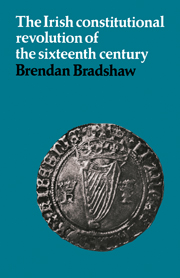Book contents
- Frontmatter
- Contents
- Dedication
- Preface
- Abbreviations
- Ireland about 1530
- PART I ‘A discourse of the cause of the evil state of Ireland and of the remedies thereof’
- 1 The medieval legacy
- 2 The Anglo-Irish movement for political reform
- 3 Henry VIII's Irish policy: Surrey's Irish expedition, 1520–2
- PART II The reform of the Lordship in the era of Thomas Cromwell, 1530–40
- PART III The liberal revolution
- Bibliography
- Index
2 - The Anglo-Irish movement for political reform
Published online by Cambridge University Press: 07 October 2011
- Frontmatter
- Contents
- Dedication
- Preface
- Abbreviations
- Ireland about 1530
- PART I ‘A discourse of the cause of the evil state of Ireland and of the remedies thereof’
- 1 The medieval legacy
- 2 The Anglo-Irish movement for political reform
- 3 Henry VIII's Irish policy: Surrey's Irish expedition, 1520–2
- PART II The reform of the Lordship in the era of Thomas Cromwell, 1530–40
- PART III The liberal revolution
- Bibliography
- Index
Summary
The origins of the movement for political reform in Ireland
One purpose of this study is to draw attention to a much-neglected – indeed largely unsuspected – aspect of sixteenth-century Irish political history, its indigenous movement for political reform. That the movement should have escaped the notice of historians is perhaps not surprising. Studies of government and society in Tudor England, despite an increasing concentration on the localities, generally envisage the dynamism for reform as emanating from the centre. The remoter regions – the north, the west, Wales – are depicted as backward and unruly. The achievement of Tudor government was to sow or – to give Edward IV his due – to resow the seeds of reform in this inhospitable soil and to bring them to fruition. Ireland being most remote, it follows that its plight was worst – culturally archaic, intellectually moribund, politically anarchic. One would all the more readily take for granted, therefore, that local stirrings of enthusiasm for political reform were by way of a reaction to stimuli provided by crown government in England.
Whatever may have been the case in the English regions, to make such an assumption about the dynamics of political reform in Ireland would be grossly distorting. As we saw, the reign of Henry VII produced only one excursion into Irish reform on the part of the Crown, one that was generally ineffectual apart from the doubtful achievement of reducing parliament to an instrument for the approval of the annual subsidy. We shall see later that the reign of Henry VIII up to the 1530s follows a similar pattern.
- Type
- Chapter
- Information
- Publisher: Cambridge University PressPrint publication year: 1979



